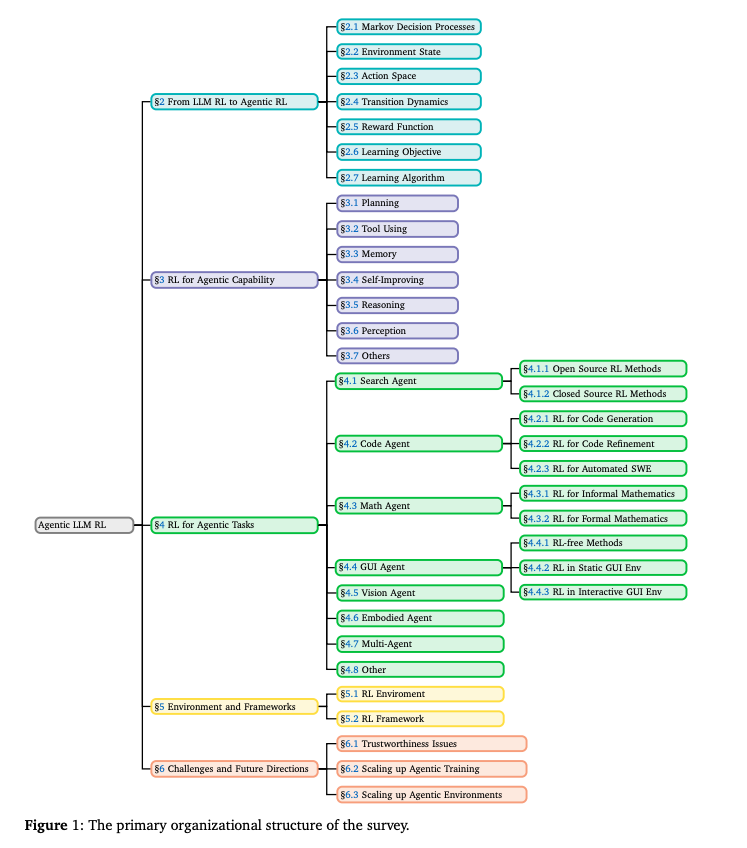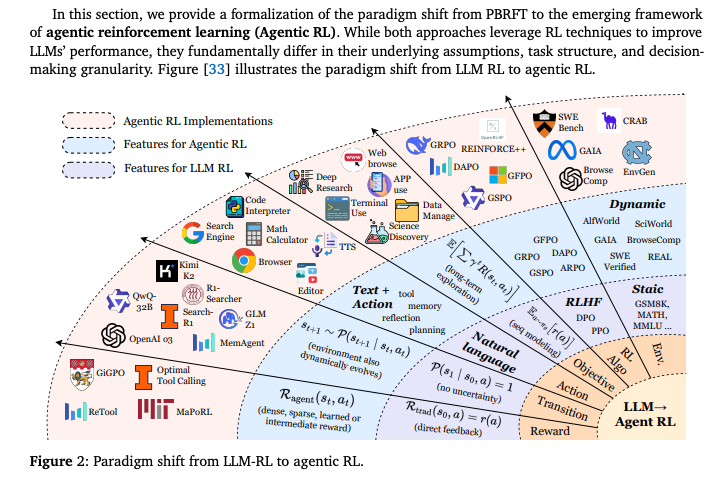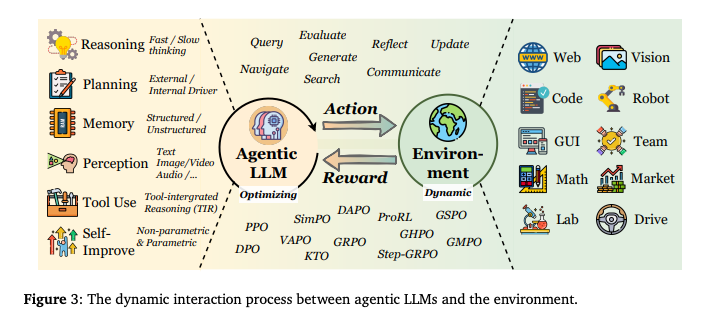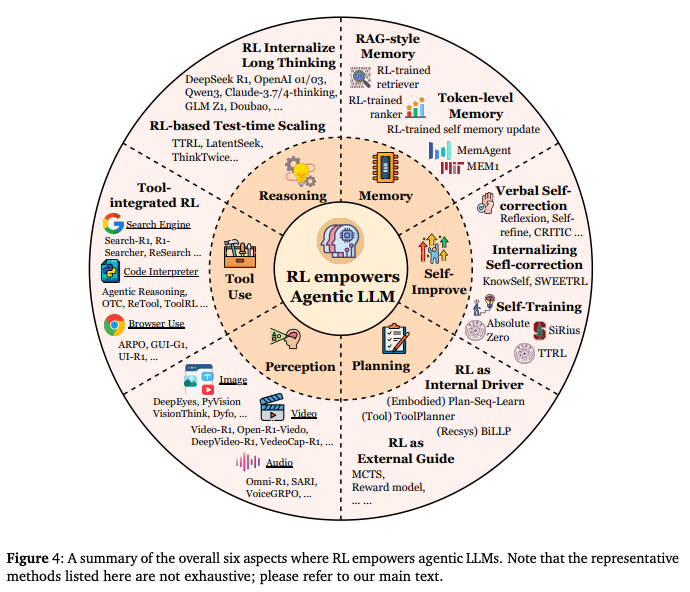AI Research - Agentic Reinforcement Learning
Imagine an AI that doesn’t just answer your questions, but actively seeks out solutions, learns from its mistakes, and improves itself over time.
This isn’t the stuff of science fiction anymore… it’s the reality being built today, thanks to a revolutionary new approach called Agentic Reinforcement Learning (Agentic RL).
Just a few days ago, a research paper, "The Landscape of Agentic Reinforcement Learning for LLMs: A Survey" was published, and it’s already sending shockwaves through the tech world. This isn't just another incremental update, it's a fundamental paradigm shift in how we think about and build artificial intelligence.
For years, we've treated Large Language Models (LLMs) like incredibly sophisticated parrots, training them to mimic human language and respond to prompts.
While impressive, this approach has its limits.
These models are passive, static, and lack the ability to truly understand and interact with the world. The core problem, as the paper brilliantly lays out, is that we've been teaching our AIs to talk, not to act. Agentic RL flips the script. Instead of just generating text, it transforms LLMs into autonomous, decision-making agents that can perceive, reason, plan, and execute tasks in complex, dynamic environments. The method is a fusion of the linguistic prowess of LLMs with the trial-and-error learning of reinforcement learning, creating a powerful feedback loop where the AI learns and adapts from its own experiences.
This technology is going to surprise even hardcore technologists.
By embracing this new model, researchers are creating AIs that can navigate the web to conduct deep research, write and debug their own code, and even make scientific discoveries.
The core contribution of this research is the conceptual leap from viewing LLMs as mere sequence generators to seeing them as nascent digital minds. It provides a comprehensive framework, a taxonomy of capabilities: planning, tool use, memory, reasoning, self-improvement, and perception.
It discusses the development trajectories that will guide the development of truly intelligent agents. In simple terms, we’ve stopped teaching our AIs to be librarians and started training them to be explorers, scientists, and engineers. This isn’t just the next step in AI, it’s the beginning of a new era.
The Breakthrough in Context
To fully grasp the magnitude of this breakthrough, we need to understand the world before Agentic RL.
Until now, the dominant method for training LLMs has been a form of sophisticated mimicry. We fed these models vast amounts of text and data, and they learned to predict the next word in a sequence. This process, while powerful, is inherently passive. The AI learns from a static dataset, and its ability to reason is limited to the patterns it has already seen. It's like learning to be a master chef by only reading cookbooks but never setting foot in a kitchen. You might be able to recite recipes perfectly, but you'll have no idea how to handle an unexpected ingredient or a malfunctioning oven.
This is where the innovation of Agentic RL truly shines. It takes the "cookbook-smart" LLM and puts it in a real, interactive kitchen. Instead of just predicting text, the AI, now an "agent" can take actions. It can use tools (like a web browser or a code interpreter), store information in its memory, and learn from the outcomes of its actions. This is a monumental improvement over previous work. The AI is no longer just a passive observer; it's an active participant in its own learning process. It can experiment, fail, and, most importantly, learn from those failures. This is the difference between memorizing a map and actually exploring a new city.
The latter leads to a much deeper, more robust understanding of the world.
The underlying assumptions of Agentic RL are what make it so powerful. It assumes that true intelligence is not just about knowledge, but about the ability to apply that knowledge to achieve goals. It assumes that learning is an ongoing, interactive process, not a one-time event. And it assumes that the world is a complex, dynamic place, and that an intelligent agent must be able to adapt to its ever-changing conditions.
These assumptions are a radical departure from the static, passive view of AI that has dominated the field for years.
This research doesn't just introduce a new technique; it reshapes the entire scientific conversation around AI. For years, the focus has been on building bigger and bigger models, hoping that intelligence would magically emerge from scale.
Agentic RL shows us that there's a better way. By focusing on the capabilities of our AIs, their ability to plan, reason, and act, we can create a new generation of intelligent agents that are not only more powerful, but also more aligned with our own goals and values. It addresses the fundamental challenge of how to bridge the gap between language and action, between knowing and doing. And in doing so, it opens up a whole new frontier in the quest for artificial general intelligence.
An Analogy
Think of a traditional LLM as a brilliant student who has memorized every textbook in the library but has never left the reading room. They can answer any question based on the books they've read, but they have no real-world experience. They can't conduct an experiment, build a machine, or even navigate their way to the cafeteria.
Now, imagine Agentic RL as a radical new apprenticeship program for this student. We give them a backpack full of tools—a compass, a hammer, a computer—and send them out into the world. They are given a goal, say, "build a treehouse." They will make mistakes. They might try to use the compass incorrectly, or use it to hammer a nail. But with each mistake, they get feedback. The nail doesn't go in. They try another tool. The hammer works. Through this process of trial, error, and feedback, they don't just learn how to build a treehouse; they learn how to learn. How to become resilient and push forward to find success. They become a resourceful, adaptable problem-solver. That's the essence of Agentic RL. It's the difference between a book-smart scholar and a world-wise artisan.
The Future Unlocked
The implications of Agentic RL are staggering, and we're only just beginning to scratch the surface of what’s possible.
In the near term, we can expect to see a new generation of AI assistants that are far more capable and autonomous than anything we have today. Imagine an AI that can not only book your flights, but also plan your entire vacation, taking into account your budget, your interests, and even the weather forecast. Or an AI that can manage your finances, investing your money, paying your bills, and finding you the best deals on everything from insurance to groceries. These aren't just incremental improvements; they are step-changes in what we can expect from our digital tools.
In the long term, the possibilities are even more profound.






